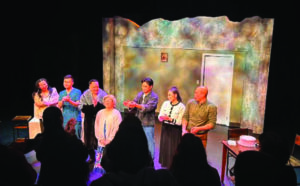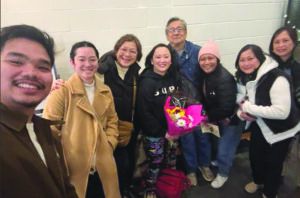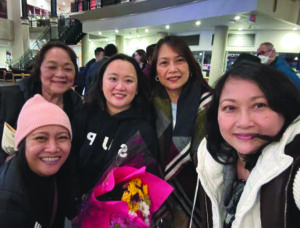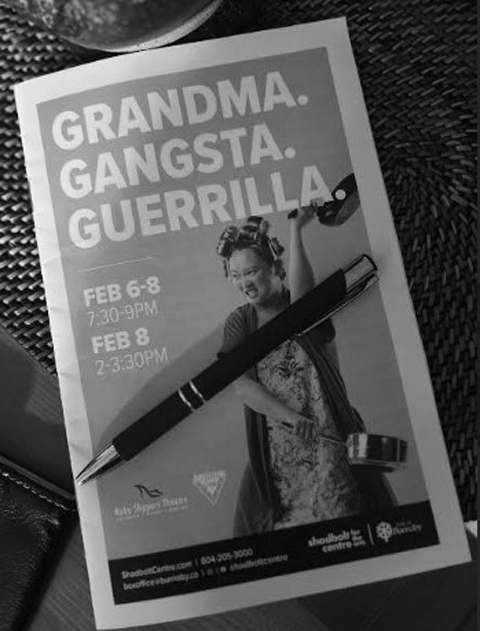Shadbolt Centre, BC, 08 February 2025 – The complexities of mental health, family dynamics, and community support are intricately woven into the narrative fabric of Grandma. Gangsta. Guerilla., a powerful play that speaks to the lived experiences of Filipino-Canadian elderlies who survived the ravages of World War II. The play, written by Filipino-Canadian playwright and artist Abi Padilla, captures the intergenerational trauma and suppleness of individuals who lived through the atrocities of both the Japanese and American wars in the Philippines. In particular, the play touches on the harrowing experiences of those who endured sexual violence, such as the Philippine comfort women—women forced into sexual slavery by Japanese soldiers during the Japanese occupation of the Philippines. These layered themes offer profound insight into the mental health struggles, the importance of family values, and the long-lasting impact of these historical wounds on Filipino-Canadian communities today.

Mental Health: The Lingering Scars of War
One of the most poignant aspects of Grandma. Gangsta. Guerilla. portrays the mental health struggles that its central character faces. These struggles are not isolated to the individual, but rather, they permeate the very fabric of their communities. For Filipino-Canadian elderlies, especially those who were survivors of war atrocities, the impact of trauma often goes unnoticed or unaddressed. In many cases, these individuals grapple with post-traumatic stress disorder (PTSD), depression, anxiety, and survivor’s guilt, often without the tools or language to articulate their pain.
The play digs into the psychological effects of war trauma, especially for the women who were victims of sexual violence during the Japanese occupation. The comfort women were subjugated to brutal conditions, and their suffering was compounded by the silence surrounding their experiences. Many of these women found themselves ostracized, unable to seek justice and left to grapple with the trauma in isolation. The deep-rooted effects of these violations manifested as mental health challenges that continued to resound across generations.

In the context of Grandma. Gangsta. Guerilla., the characters’ struggles with their past are framed through the lens of Filipino-Canadian identity. The intergenerational trauma faced by these elders is passed down to their children and grandchildren, perpetuating cycles of silence, shame, and unresolved emotional pain. The challenges they face in confronting their history reflect the broader difficulties faced by communities that are often marginalized and left without proper mental health support.
Are Family Values a Source of Healing or Harm?
Filipino family values are traditionally centred around strong kinship ties, respect for elders, and a sense of communal responsibility. Grandma. Gangsta. Guerilla. explores how these values can be both a source of support and, at times, a constraint for the survivors of war. For the elderly, family is the refuge from their painful memories. However, the burden of trauma often disrupts these family dynamics. The survivors’ inability to express their suffering due to cultural stigmas or fear of burdening younger generations can lead to emotional distance within the family unit.
For comfort women, the pain of sexual violence was not easily shared, either due to cultural taboos surrounding discussions of sexuality or fear of being blamed or rejected by their families. The play accentuates the delicate balance between familial care and the unresolved trauma hidden beneath the surface. Although family can be a source of strength and solidarity, there is also the danger that the trauma of the past goes unaddressed, thus perpetuating cycles of mental anguish.
At the same time, the play suggests that breaking the silence within the family can be a critical step in healing. By acknowledging the painful experiences of the past, the characters in Grandma. Gangsta. Guerilla. begin to confront the trauma that binds them. The characters find a sense of agency and emotional catharsis through these difficult conversations and the reconnection with their history.
Community Impact: From Isolation to Collective Strength

The Filipino-Canadian community is central to the story told in Grandma. Gangsta. Guerilla. The play highlights how the experiences of war victims affect not only the individual but the broader community as well. Filipino-Canadians, particularly those who belong to the elderly generation, often find themselves marginalized in a society that fails to understand their pain. Their stories of survival, hardship, and resistance are seldom shared within mainstream Canadian discourse, leading to isolation and a lack of recognition.
However, the play reveals the power of community and collective strength. By bringing together individuals who share similar experiences of trauma, the play suggests that healing can begin. The Filipino-Canadian community, despite its struggles with mental health stigma and historical erasure, possesses a deep well of resilience. The elderly’s stories become personal and collective narratives—stories of survival that potentially transform the community’s understanding of its past.
The impact of Grandma. Gangsta. Guerilla. is not just in its depiction of individual trauma but also in its portrayal of how the community can function as a healing space. By acknowledging and addressing the historical wounds that have been carried for decades, Filipino-Canadians have the potential to reclaim their narratives and build a more supportive and understanding future for their younger generations.
Grandma. Gangsta. Guerilla. is a profound exploration of the intersection of mental health, family values, and community impact within the context of post-war Filipino-Canadian experiences. Through its poignant depiction of the trauma experienced by comfort women and other war survivors, the play challenges us to confront the silenced histories of marginalized groups and to create spaces where healing can begin. By acknowledging the past, breaking the silence, and supporting one another, the Filipino-Canadian community can transform its collective wounds into sources of strength, resilience, and hope for future generations.
By Bella Balisi-Bevilacqua
(MBB)



